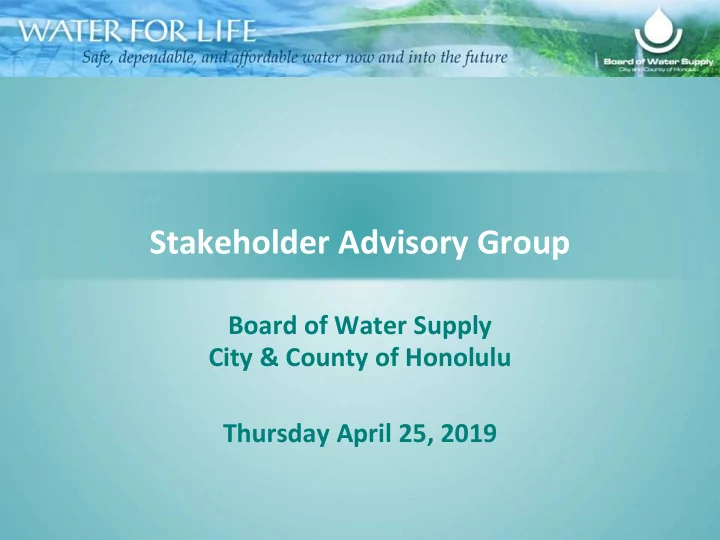

Stakeholder Advisory Group Board of Water Supply City & County of Honolulu Thursday April 25, 2019
Barry Usagawa Program Administrator Water Resources Division Honolulu Board of Water Supply City and County of Honolulu CLIMATE CHANGE PANEL DISCUSSION
BWS Strategic Plan Brown and Caldwell 1
Brown and Caldwell 2
April 25, 2019 Impacts of Climate Change on Honolulu Water Supplies and Planning Strategies for Mitigation Barry Usagawa, P.E., Water Resources, Board of Water Supply
Objectives • Evaluate climate change impacts on Honolulu Board of Water Supply (BWS) infrastructure and water supply • Develop a suite of strategies to address the anticipated changes This project supports Water Research Foundation’s (WRF) Climate Change Strategic Initiative objective to provide water utilities with a set of tools to assess their vulnerabilities and develop applicable adaptation strategies. Jointly funded by Honolulu Board of Water Supply and Water Research Foundation through Water Research Foundation’s Tailored Collaboration Program
The BWS Water System is Large and Complex Brown and Caldwell 5
Project Approach • Adaptive management is an iterative process for flexible decision making in the face of uncertainties • Utilized scenario planning to consider a range of potential changing conditions Vulnerabilities & adaptive management strategies identified for 3 time frames: • Short-term (2020–2030) • Mid-term (2030–2050) • Long-term (2050–2100) Goal is to develop policies and actions that encourage “no regrets” strategies.
Vulnerability Assessment Approach
Downscaled Climate Models indicate a Range of Rainfall Futures Climate Change - Rainfall Projections Recharge Recharge range: range: between between -0.3% and -4% and +21.5% -72% Source: Figure developed by Abby Frazier April 2017
Curre rrent S SY and Potential R l Range o of SY from C Climate F Forecasts Current: 407 mgd mgd, Low: 300 mgd mgd, High gh: 4 443 mgd mgd Brown and Caldwell 9
Preliminary Supply Adaptation Strategies: Rechar arge could d decreas ase Oah Oahu s sustainable yie yields b by y ~27%. S Stat atistical al m model From 407 mgd mgd to 300 mgd a mgd a di difference of 107 mgd mgd, Turk, R Rep eport #9, B&C. • Reduce per capita water demand from 155 gpcd to 100 gpcd through aggressive water conservation, like dual plumbing with recycled water • Storm water capture in Nuuanu and on-site for new development • Expanded Reuse at Honouliuli, Mililani, Wahiawa and Schofield WWTP’s • On-site reuse • Increase transfers from Wahiawa and Waipahu Waiawa aquifers to Waianae and Honolulu. Drill more wells in Wahiawa and Waipahu-Waiawa • Assertion of Public Trust Water Rights for Domestic Use to retain water use permits in a revocation process • More desalination in Ewa and possibly for Honolulu • Desalinated reuse in Honolulu, Waianae and Hawaii Kai where wastewater effluent is too salty for irrigation • Indirect or Direct Potable Reuse with RO desalination and UV/Ozone disinfection Brown and Caldwell 10
Infrastructure Impacts from Sea Level Rise
3.2 feet of SLR Exposure Areas on Oahu Brown and Caldwell 12
24 Low Elevation/Coastal Water Pipeline Bridge Crossings may be subject to coastal erosion impacts.
Corrosion impacts to 21 miles of metallic pipelines with 3.2’ of SLR by 2100 3,500 25,000 MI_2100 MI_2050 GWI_2100 3,000 20,000 2,500 h (feet) h (feet) 15,000 Pipe Length ( 2,000 Pipe Length ( 1,500 10,000 1,000 5,000 500 0 0 1.25 1.5 2 2.5 3 4 6 8 10 12 14 16 20 24 30 36 42 1.25 1.5 2 2.5 3 4 6 8 10 12 14 16 20 24 30 36 42 Pipe Diameter ( r (inch) h) Pipe Diameter ( r (inch) h)
Nimitz & Alakawa, July 3, 2018, 8:00 am, Lowest high tide of the day. Highest tide 1’ higher
2017 - King Tide - Waikiki Courtesy of OCCSR
2017 - King Tide – Ala Wai Canal Courtesy of OCCSR
2017 - King Tide - Mapunapuna Courtesy of OCCSR
2017 - King Tide – Maunalua, Ala Moana Courtesy of OCCSR
End-of-Century Sea Level Rise Could be Greater 3 ft S Sea ea Level el R Rise 4 ft S Sea ea Level el R Rise 5 ft S Sea ea Level el R Rise 6 ft S Sea ea Level el R Rise Source: Habel et al. 2017
Flood Insurance Rate Map (FIRM) * * Special Flood * Hazard Area: * 100-year * flood plain * * October 2018 P RIMARY U RBAN C ENTER W ATERSHED M ANAGEMENT P LAN 21
Miami
• • • •
Miami, WRA Webinar 2017
Miami, WRA Webinar 2017
Miami, WRA Webinar 2017
Miami, WRA Webinar 2017
Draft Adaptation Framework/Action Plan Brown and Caldwell 28
WRF Study Identified Two Candidate Pilot Areas for Sea Level Rise Adaptation West Waikiki Iwilei Possible Selection & Prioritization Criteria: Potential severity of social, economic, or environmental impacts • • Taxable real estate; flood impacts to pedestrians, commercial and recreation activities, tourism, transportation and infrastructure. • Opportunity to add SLR adaptation measures with proposed improvements • Ala Wai Flood Mitigation Project Iwilei Transit Oriented Development Plan • Brown and Caldwell 29
Iwilei Redevelopment Concept to Live with Water Concept, For Illustration Only Brown and Caldwell 30
The One Water Cycle
Acknowledgements Technical Advisory Committee Research Team • Victoria Keener, PhD, Pacific RISA Principal Investigators • Tom Giambelluca, PhD, University • Dean Nakano, of Hawaii (UH) • Lynn Stephens, P.E. • Chip Fletcher, PhD, UH • Jon Turk, P.G. • Scot Izuka, PhD, US Geological Survey (USGS) Project Team • Delwyn Oki, PhD, USGS • Susan Mukai • Lenore Ohye, Commission on Water Resource Management • Joanie Stultz • Joanna Seto, PE, Department of Health Project Advisory Committee • Nancy Matsumoto, Board of Water Supply • Laurna Kaatz, Denver Water/Water Utility Climate Alliance • Adam Carpenter, American Water Works Association • David Yates, National Center for Atmospheric Research • Kenan Ozekin, Water Research Foundation
Recommend
More recommend